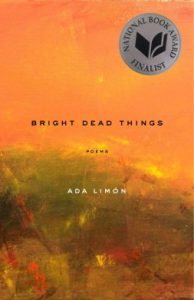 Over the weekend. while preparing my own poems for workshop, I read that writing poetry, more so than other writing genres, is about finding the “just right word.” I often feel, after having read a poem by Ada Limón, that she is more than proficient in doing this. Not only does Limón choose the “just right word,” her composition of those words is stunning.
Over the weekend. while preparing my own poems for workshop, I read that writing poetry, more so than other writing genres, is about finding the “just right word.” I often feel, after having read a poem by Ada Limón, that she is more than proficient in doing this. Not only does Limón choose the “just right word,” her composition of those words is stunning.
This morning, we fucked
each other into a regular
backyard bonfire…
…
I swear, I’ll try harder not to
miss as much: the tree, or how
your fingers under still
sleep-stunned sheets
coaxed all my colors back. (6-20)
“The Tree of Fire,” the poem from which that excerpt comes, deals heavily in loss: loss of place, and perhaps more obvious, loss of a lover. We saw earlier in the book, in Limón’s poem “The Last Move,” that she moved with a love interest to Kentucky. Like so many of us have done — give up what makes us us — in “The Tree of Fire,” she seems to miss the touch of that same lover. I wonder, still, what Limón means by those final lines. (15)
I also find that even in her prose, she makes attempts at finding the perfect words. In “The Quiet Machine,” it’s the phrase like “Kentucky silent,” and in “I Remember the Carrots,” it’s the book’s title — “bright dead things.” Moments like these happen throughout the collection. In “State Bird,” it’s phrases like “strange beast” and “loud, obvious blur.” (19)
Questions:
- What emphasis do the repeated words in “The Quiet Machine” have?
- How important is form in Limón’s poetry, especially in the poems we read for Thursday’s class? Can you draw any conclusions about line arrangement? Are all of the lines end-stopped?
- “The Quiet Machine” and “Miracle Fish” are written as prose poems; why might have Limón chosen to structure these poems in this way? They quite a bit more narrative than others we’ve read; could this have been a reason she chose this structure? What other reasons may she have decided to do so?
- Are there any moments where you found the figurative language particularly effective or interesting? (e.g., metaphor, alliteration, etc.)
- What effect do the italicized words, the dialogue, have on the poem “Someplace Like Montana”?
- In the poem “Miracle Fish,” the line “This earth is blessed. Do not play in it” was the moment the poem opened to me. Were there any moments, in any of the poems, in which they “opened up” for you?
